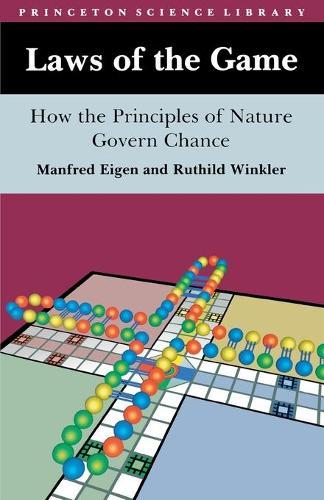Overview
Using game theory and examples of actual games people play, Nobel laureate Manfred Eigen and Ruthild Winkler show how the elements of chance and rules underlie all that happens in the universe, from genetic behavior through economic growth to the composition of music. To illustrate their argument, the authors turn to classic games--backgammon, bridge, and chess--and relate them to physical, biological, and social applications of probability theory and number theory. Further, they have invented, and present here, more than a dozen playable games derived from scientific models for equilibrium, selection, growth, and even the composition of RNA.
Full Product Details
Author: Manfred Eigen ,
Ruthild Winkler ,
Robert Kimber ,
Rita Kimber
Publisher: Princeton University Press
Imprint: Princeton University Press
Edition: New edition
Volume: 10
Dimensions:
Width: 14.00cm
, Height: 2.30cm
, Length: 21.60cm
Weight: 0.397kg
ISBN: 9780691025667
ISBN 10: 0691025665
Pages: 368
Publication Date: 11 April 1993
Audience:
General/trade
,
College/higher education
,
Professional and scholarly
,
General
,
Tertiary & Higher Education
Format: Paperback
Publisher's Status: Active
Availability: Manufactured on demand

We will order this item for you from a manufactured on demand supplier.
Language: English
Reviews
Fascinating ... has the character of the deepest sort of discussion among brilliant friends. The New Yorker Remarkable, fascinating, and very profound. The New York Times Book Review
Fascinating ... has the character of the deepest sort of discussion among brilliant friends. -- The New Yorker Remarkable, fascinating, and very profound. -- The New York Times Book Review
When physics was scientific top dog, celebrated innovators like Erwin Schrodinger contemplated biology in books like What Is Life? Now that molecular biology is enthroned, its masters in turn have penned volumes like Monod's Chance and Necessity. Now chemists Eigen and Winkler (Max Planck Institute, Berlin) continue the tradition, drawing upon mathematical, physical, and molecular biological ideas to weave a synthesis that seeks to establish a rational or lawful basis for evolution and selection. Their ideas draw heavily upon game and set theory, essentially as developed by yon Neumann and Morgenstern. The first part of this scholarly (and smoothly translated) volume reviews probabilities and rules in board games with various levels of information, payoffs, and strategies. From there the authors develop notions of chance - the mutant molecule - acting within a system in which there are extraordinarily large numbers of alternatives: possible protein molecules, for example. Their thesis is that there is a lawful process by which certain macromolecules will be favored (selected) by the rules of the game. Early in the history of the planet, combinations of certain molecules led to an autocatalytic process - self-replicating macromolecules. Life. Natural law can be interpreted, therefore, in terms of thermodynamics and statistical mechanics. These are the forces that channel or tame chance so that certain directions are chosen. The many short chapters, diagrams, games, aphorisms, and literary references that the authors use to amplify the theme lend a certain charm and sophistication to the book. But the essential game theoretic basis will be challenged by those scholars who have lately taken to question the bases for rational or optimal strategies. No doubt others will find the attempt to fit all of nature from inert pebble to works of art or music into one grand scheme of game-play either hubris or the ultimate reductionism. From the point of view of philosophy or history of science, the thesis is at once provocative and also characteristic of that German philosophical Weltanschauung - a romantic idealism with emergent entities - that follows in the tradition of Leibniz and Goethe. (Kirkus Reviews)
Author Information
Manfred Eigen and Ruthild Winkler are scientists at the Max Planck Institute for Biophysical Chemistry. In 1967 Eigen received the Nobel Prize for chemistry.



